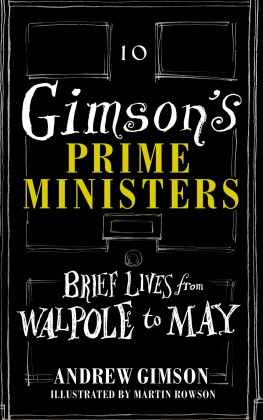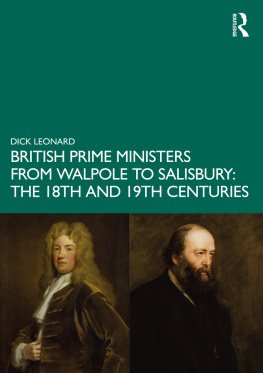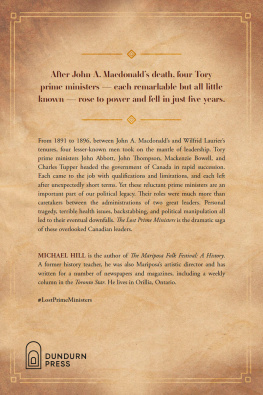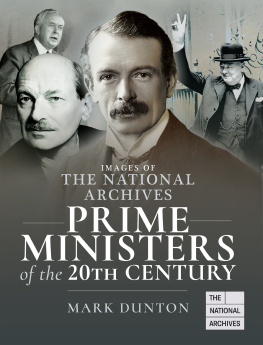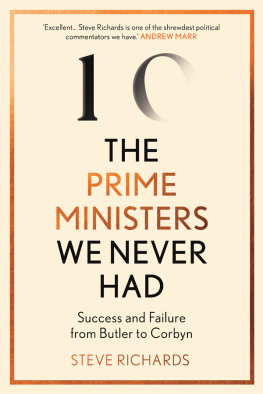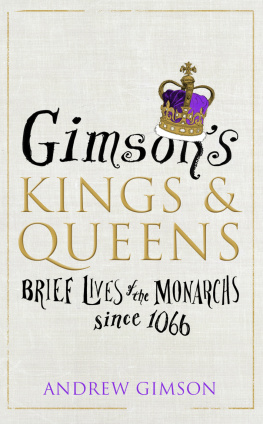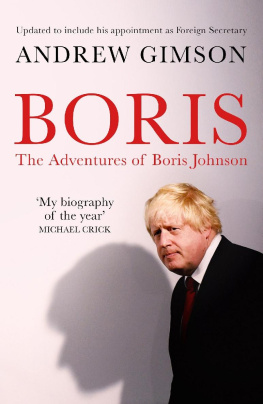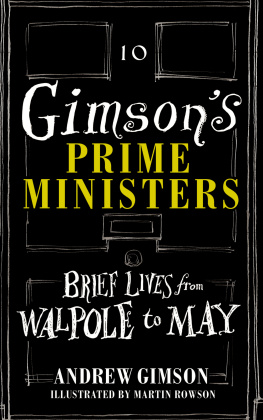CONTENTS
ABOUT THE BOOK
A concise, sharp-witted and illuminating account of the lives of Britains prime ministers from Walpole to May, illustrated by Martin Rowson.
For the reader who has heard of such giants as Gladstone and Disraeli, and has drunk in a pub called the Palmerston, but has only the haziest idea of who these people were, Gimsons Prime Ministers offers a short account of them all which can be read for pleasure, and not just for edification. With Gimsons wonderful prose once again complemented by Martin Rowsons inimitable illustrations, this lively and entertaining aide-memoire and work of satirical genius brings our parliamentary history to life as never before.
ABOUT THE AUTHOR
Andrew Gimson is the author of Boris: The Rise of Boris Johnson, published by Simon & Schuster in 2006 and described as brilliant, scintillating and an effervescent delight. He writes for a wide range of newspapers and magazines, and is a contributing editor to ConservativeHome.com. He lives in London.
Also by Andrew Gimson
The Desired Effect
Boris: The Adventures of Boris Johnson
Gimsons Kings & Queens: Brief Lives of the Monarchs since 1066
For Sally
Never was man more flattered nor more abused; and his long power was probably the chief cause of both.
L ORD C HESTERFIELD ON S IR R OBERT W ALPOLE, PRIME MINISTER 172142
Yes, I have climbed to the top of the greasy pole.
B ENJAMIN D ISRAELI ON BECOMING PRIME MINISTER IN 1868
Never forget, Arthur, the garden belongs to Number 10, and has nothing to do with Number 11.
L ORD R OSEBERY, WHO HAD RESIGNED FROM THE PRIME MINISTERSHIP SEVEN YEARS EARLIER, ADVISING A RTHUR B ALFOUR ON BECOMING PRIME MINISTER IN 1902
There is one thing about politics that I think cannot be disputed: if a man stays in them long enough, they nearly always reveal him for what he is, and he tends to get not only what he deserves, but to find in his fate the reflection of his own strength and weakness.
C LEMENT A TTLEE, PRIME MINISTER 194551
Gladstone and Disraeli never had to put up with this.
H AROLD M ACMILLAN AS PRIME MINISTER, WHILE WALKING DOWN A LITTER-FILLED CORRIDOR IN A HOTEL IN L LANDUDNO DURING THE C ONSERVATIVE P ARTY CONFERENCE IN 1962
INTRODUCTION
To become prime minister, and play the role with some slight degree of success, you will need the following qualities:
- Courage.
- Luck.
- Hunger for power.
- Eloquence, including the ability to think on your feet in the Commons.
- The ability to distribute patronage in such a way as to gratify to a sufficient degree the appetites of your followers. Contenders for the prime ministership who have thought themselves too grand to do this have failed.
- A different style to your predecessor, of whom people have grown sick. Soon they will be sick of you.
- An acute feel for public opinion, and, in the earlier part of this book, an equally acute sense of how to manage the monarch. The longer you are in Downing Street, the harder it becomes to see things as others see them, or even to remember this is necessary.
- The capacity to rise to a crisis, and give the nation its idea of itself.
- An understanding of the money, which is the most important thing controlled by the Commons.
- Respectability, or at least the absence of embarrassing eccentricities.
- The energy and stamina to do (and to want to do) very heavy work. Overwork has shortened the lives of many of the people in this book.
- The willingness and skill to perform that most humiliating manoeuvre, the U-turn. A free people cannot be ordered about: you are there to persuade MPs, and the wider nation, to follow your lead, which cannot be in a direction they do not want to take. You are not a tyrant, and must sometimes have the common prudence to change course. So although you need to know when to stick to your guns, you must also convey a tactful awareness of your own vulnerability.
The prime minister requires, in fact, a bizarre combination of qualities. He or she must be at once ordinary and extraordinary, conventional and innovative, safe and audacious, banal and brilliant, a follower and a leader, sensitive to every change in the political weather but tough enough to endure terrible disasters, on the side of the people but able to build a Cabinet from members of the elite.
For a short time, a certain individual may manage to do this better than anyone else. But it is not something anyone is likely to be able to do for very long. The average length of time each of the prime ministers in this book has spent in office, not always in a single stint, is five and a half years. At the top end of the scale is Sir Robert Walpole, who was in power for twenty years and 309 days. At the bottom we find George Canning, a brilliant and amusing figure, but prime minister for only 119 days.
The secret of the prime ministers is that they are weak. We give them an impossible job and blame them when they fail to perform it. The prime minister serves as a kind of glorified scapegoat. It is notable how many of them are remembered, if at all, for a single failure: Lord North for losing the American colonies, Neville Chamberlain for the fruitless appeasement of Hitler, Sir Anthony Eden for the Suez debacle, Tony Blair for the Iraq War, David Cameron for losing the EU referendum. Throughout the twentieth century, British prime ministers strove to cope with the decline and fall of the British Empire, something even Winston Churchill could not avert.
In the eighteenth century, the prime ministers function was to take the blame on behalf of the monarch. Nowadays, he or she is there to take the blame on behalf of the people, and often on behalf of colleagues too. The Conservatives treated one of their most remarkable leaders, Sir Robert Peel, as a renegade, while Labour MPs came to regard Ramsay MacDonald, who had done so much to create their party, as the worst traitor of all. The role of prime minister is essentially a sacrificial one.
Not that those who compete against each other for it are inclined to see it in this light. They believe they will be powerful, and they assure us they have the solutions we seek, however disappointing their predecessors may have proved. And it is true that most of them have a honeymoon period during which we allow ourselves to share in their optimism, for as voters we are torn between conflicting impulses. We long to believe we have found a saviour, but are determined to throw overboard whoever fails to save us. We allow the stage to be dominated for a time by a successful prime minister, but then restore equality (for which all democracies have a deep yearning) by dragging that individual back down to our own level, often with brutal abruptness.
Previous writers have sought to define the office of prime minister in terms of its fluctuating powers: an approach that can lead to arid constitutional theorising. In this book, temperament is restored to the central place it always in practice occupies.
The greatest prime ministers have tended to be fighters and gamblers. But after a warrior PM the country often wants a calmer, more consensual figure, who may have a touch of greatness too. Clement Attlee, who succeeded Churchill, was the greatest master of understatement in British history, but also, by conducting a team of strong ministers, one of the greatest reformers.

